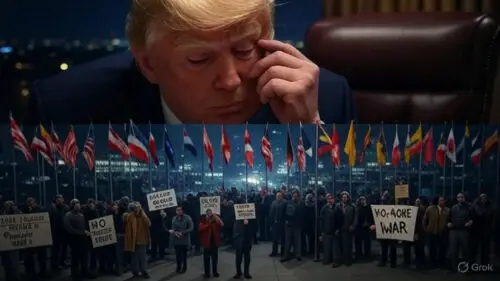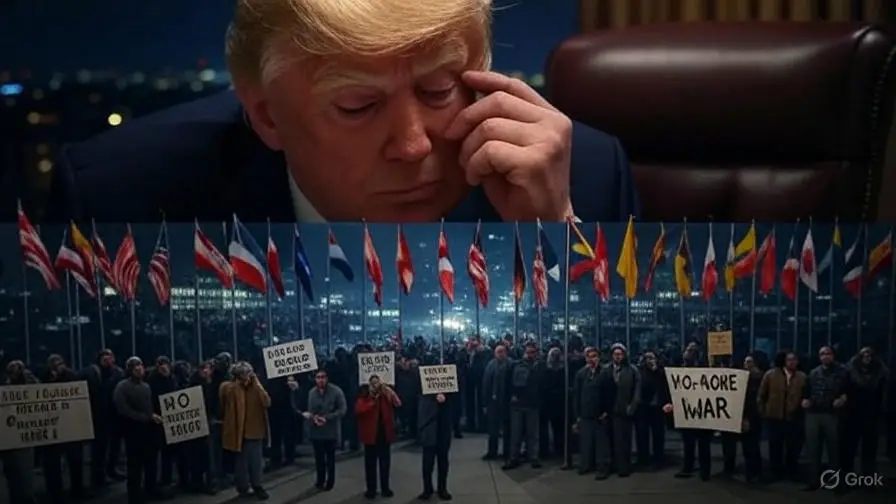
On June 21, 2025, U.S. President Donald Trump announced that American forces, using B-2 stealth bombers and Tomahawk cruise missiles, conducted precision strikes on three Iranian nuclear facilities—Fordow, Natanz, and Isfahan—claiming a “spectacular military success” aimed at curbing Iran’s nuclear ambitions. The operation, dubbed “Midnight Hammer,” has thrust the United States into the Israel-Iran conflict, escalating tensions across the Middle East. Amid the global shock, unverified claims circulating on platforms like X allege that Pakistan, a regional neighbor, may have facilitated the U.S. operation by granting access to its airspace or bases, a move some describe as a betrayal of its complex relationship with Iran. These allegations, though unconfirmed by official sources, have sparked intense speculation about Pakistan’s motives, especially following its paradoxical nomination of Trump for the 2026 Nobel Peace Prize just a day before condemning the strikes. This article delves into the diplomatic intricacies, strategic implications, and unanswered questions surrounding this pivotal moment in global affairs.
Trump Bombs Iran: A Bold Strike with Global Ramifications
The U.S. operation targeted Iran’s heavily fortified nuclear sites, with Fordow—a facility buried deep underground—hit by 14 massive 30,000-pound bunker-buster bombs, and Natanz and Isfahan struck by over 30 cruise missiles. President Trump, in a televised address, declared the strikes had “completely and totally obliterated” Iran’s nuclear enrichment capabilities, a claim disputed by Iranian officials who reported limited damage and vowed retaliation. The operation, which involved over 125 aircraft, including seven B-2 bombers flying 37-hour missions from Missouri, marked the first combat use of the Massive Ordnance Penetrator (MOP) bombs, signaling a dramatic escalation in U.S. involvement in the Israel-Iran conflict that began with Israeli strikes nine days earlier.
The strikes have drawn mixed reactions. Congressional Republicans, such as Senators Katie Britt and Roger Wicker, praised the operation as “strong and surgical,” arguing it neutralized a significant threat to global security. However, Democrats like Representative Alexandria Ocasio-Cortez condemned the strikes as unconstitutional, citing the lack of congressional authorization. Internationally, France, the UK, and Germany urged Iran to return to nuclear negotiations, while China, Russia, and Pakistan proposed a U.N. Security Council resolution for an immediate ceasefire, reflecting deep concerns about regional stability.
Pakistan’s Alleged Role: Betrayal or Strategic Pivot?
The most intriguing and controversial aspect of this saga is the unverified speculation that Pakistan enabled the U.S. strikes by providing access to its airspace or military bases. Posts on X have fueled this narrative, with users claiming that Pakistan’s military leadership, under General Asim Munir, struck a deal with Trump during recent White House talks. These claims suggest Pakistan traded support for U.S. defense technology and security pacts, potentially prioritizing its own strategic interests over its historically complex ties with Iran. Such allegations, if true, would mark a significant shift in Pakistan’s foreign policy, given its 900-kilometer shared border with Iran and their history of cooperation despite sectarian differences.
Pakistan’s response adds layers of complexity. On June 20, Pakistan’s foreign ministry lauded Trump as a “genuine peacemaker” for his role in de-escalating a brief India-Pakistan conflict, nominating him for the Nobel Peace Prize. Yet, a day after the U.S. strikes, Pakistan condemned the attack on Iran’s nuclear sites as a violation of international law, expressing “grave concern” over escalating tensions. This rapid shift has led analysts to question whether Pakistan’s condemnation is genuine or a diplomatic maneuver to appease domestic and regional audiences, particularly given the protests in Karachi where thousands marched against the U.S. and Israel, trampling an American flag adorned with Trump’s image.
Why Would Pakistan Shift Allegiances?
The notion of Pakistan facilitating U.S. strikes raises critical questions about its motivations. Pakistan and Iran have maintained a delicate balance, marked by cooperation on trade and counterterrorism but strained by sectarian divides and differing regional alignments. Pakistan’s Sunni-majority government has occasionally clashed with Iran’s Shia leadership, yet both nations have avoided open conflict. The alleged deal with the U.S., if true, could reflect Pakistan’s desire to secure advanced military technology and strengthen ties with Washington at a time when its economy and security face significant challenges.
Some analysts suggest Pakistan may have seen the U.S. operation as an opportunity to weaken Iran, a regional rival, without direct involvement. Others argue that Pakistan’s leadership, wary of being drawn into a broader conflict, may have acted under pressure from Washington, leveraging its strategic position to extract concessions. However, these claims remain speculative, as no official confirmation has emerged from either the U.S. or Pakistan. The lack of transparency fuels curiosity: what could drive a nation to risk alienating a neighbor for a high-stakes gamble with a global superpower?
The Diplomatic Fallout: A Region on Edge
The U.S. strikes have placed the Middle East at a crossroads. Iran, weakened but defiant, has vowed “everlasting consequences” and reserved the right to retaliate, potentially targeting U.S. interests or closing the Strait of Hormuz, a critical oil chokepoint. Israel, which had struggled to destroy Fordow due to its fortifications, hailed the U.S. intervention as a decisive blow to Iran’s nuclear program. Meanwhile, global powers are scrambling to prevent further escalation. The joint statement from France, the UK, and Germany underscores the urgency of diplomacy, while China and Russia’s push for a U.N. resolution signals their opposition to unilateral U.S. actions.
Pakistan’s position is particularly precarious. If the allegations of its involvement are substantiated, it risks alienating Iran and facing domestic backlash, as evidenced by the protests in Karachi. Yet, closer alignment with the U.S. could bolster Pakistan’s military and economic prospects, especially if Trump’s promised defense technology materializes. The contradiction between Pakistan’s Nobel nomination and its condemnation of the strikes suggests a nation navigating a tightrope, balancing domestic sentiment, regional alliances, and global ambitions.
What’s Next for the U.S., Iran, and Pakistan?
The strikes have upended Trump’s earlier push for diplomacy, as he had sent envoys to negotiate with Iran just days before the operation. The decision to bomb Iran, reportedly finalized after Israel’s initial strikes weakened Iranian defenses, reflects a calculated risk to eliminate a perceived existential threat. However, the U.S. intelligence community, including Director Tulsi Gabbard, has disputed claims that Iran was on the verge of developing a nuclear weapon, raising questions about the strikes’ justification.
For Iran, the path forward is fraught with challenges. Rebuilding its nuclear program will be costly and time-consuming, potentially strengthening hardliners who favor retaliation over negotiation. For Pakistan, the alleged role in the strikes could reshape its regional standing, either as a strategic partner of the U.S. or a pariah among Muslim-majority nations. The Organization of Islamic Cooperation (OIC) has been urged to condemn Pakistan’s alleged involvement, highlighting the potential for broader diplomatic fallout.
A Curious Crossroads in Global Politics
The events of June 21, 2025, have left the world grappling with more questions than answers. Did Pakistan truly facilitate the U.S. strikes, or are these claims a product of misinformation amplified on social media? If Pakistan did play a role, what concessions did it secure, and at what cost to its regional relationships? The U.S. strikes, while militarily impressive, have plunged the Middle East into uncertainty, with Iran’s response looming as a critical unknown. As global leaders call for de-escalation, the interplay between Trump’s bold foreign policy, Pakistan’s alleged duplicity, and Iran’s resilience will shape the region’s future. The world watches, curious and apprehensive, as this high-stakes drama unfolds.

















